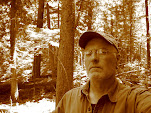The winds are coming and while I delay too long, I still can make the water in time for relative calm. My task today to check on the goose nests that were just being built two days ago. I put in in the south lagoon and as I paddle up the east channel of the burial island, I notice what are possibly scent mounds. There are four within 30 yards on the banks of the channel and I think they might be the workings of the beaver. This would be a logical boundary between the 520 lodge and the hidden lodge and I even found a dead beaver here not long ago. One of my books says that beaver will fight viciously over territory.
When I reach the big lodge, east of the east marsh, I find the nest abandoned. It is thinnest beginnings of a nest, just some out of place grasses. I find two geese, possibly the same ones, around the back and it looks like they might be scouting a nest site. There are numerous hummocks in this part of the east marsh and perhaps they will nest here. I did not think that their first choice for a nest was a good one being much too exposed. I skid across the bay in increasing wind. When I start it is small chop with shivers on the surface and in the 10 minute crossing the waves near whitecaps by the time I reach the cattails of #2 Island. Swallows have returned in force and there are dozens darting about in mid-bay where I saw a single solitary one just a few days back.
I take refuge in the cattails, which rustle in the wind, and as my canoe squeals across a submerged log, two geese take flight from quite near honking loudly in protest of my presence.
The nest on the west lodge is still occupied and shows additional work. There is down mixed in with the grasses and the female does not budge as I near. The male moves toward me, putting himself between me and the lodge although he is much more interested in chasing other geese away and does so once. This nest looks like it will stay. I've seen geese nest here in the past and it is high and dry and protected from too much sun and too much wind. If there were eggs at this time, the male would have been much more forceful.
small things
2 weeks ago


No comments:
Post a Comment